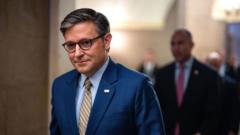Congress faces a potential government shutdown as Republican leaders scramble to navigate their opposition to a bipartisan funding agreement endorsed by House Speaker Mike Johnson, urged by President-elect Donald Trump and tech billionaire Elon Musk.
Trump and Musk's Opposition Push US Shutdown Looming Ahead

Trump and Musk's Opposition Push US Shutdown Looming Ahead
As the clock ticks down, Trump and Musk rally to reject bipartisan spending deal.
Following this denial, Speaker Johnson's 1,500-page spending bill is at risk, with both figures pushing for a more restrictive alternative stripped of Democratic elements. With a midnight deadline approaching, the survival of federal operations hinges on swift negotiations among Republican lawmakers who are now questioning their initial commitment to the bipartisan plan.
This proposed funding bill was designed to extend government support through March, following the absence of a budget for the 2025 fiscal year, which started on October 1. However, both Trump and Vice-president-elect JD Vance have faced backlash for their public opposition. Musk, tasked by Trump to minimize federal spending, has actively campaigned against the deal via social media, reinforcing a divide among party members.
Republican representatives are under pressure, with Scalise labeling the proposed bill as dead, and Trump's threats to oust any Republican voting for it heightening the urgency. The initial agreement included critical funding for disaster relief and aid for farmers but has now come under fire from within its own party.
Democrats are unlikely to support any revised proposal, creating an impasse as both parties ready for internal discussions. White House Press Secretary Karine Jean-Pierre emphasized the dangers of playing political games, urging Republicans to observe the bipartisan agreement's terms.
Historically, government shutdowns disrupt vital services, and the stakes are high as lawmakers reflect on past crises, particularly a record 35-day shutdown during Trump's presidency. The current situation presents a critical juncture for US lawmakers, as they grapple with both immediate pressures and the long-term implications of their choices.
This proposed funding bill was designed to extend government support through March, following the absence of a budget for the 2025 fiscal year, which started on October 1. However, both Trump and Vice-president-elect JD Vance have faced backlash for their public opposition. Musk, tasked by Trump to minimize federal spending, has actively campaigned against the deal via social media, reinforcing a divide among party members.
Republican representatives are under pressure, with Scalise labeling the proposed bill as dead, and Trump's threats to oust any Republican voting for it heightening the urgency. The initial agreement included critical funding for disaster relief and aid for farmers but has now come under fire from within its own party.
Democrats are unlikely to support any revised proposal, creating an impasse as both parties ready for internal discussions. White House Press Secretary Karine Jean-Pierre emphasized the dangers of playing political games, urging Republicans to observe the bipartisan agreement's terms.
Historically, government shutdowns disrupt vital services, and the stakes are high as lawmakers reflect on past crises, particularly a record 35-day shutdown during Trump's presidency. The current situation presents a critical juncture for US lawmakers, as they grapple with both immediate pressures and the long-term implications of their choices.























